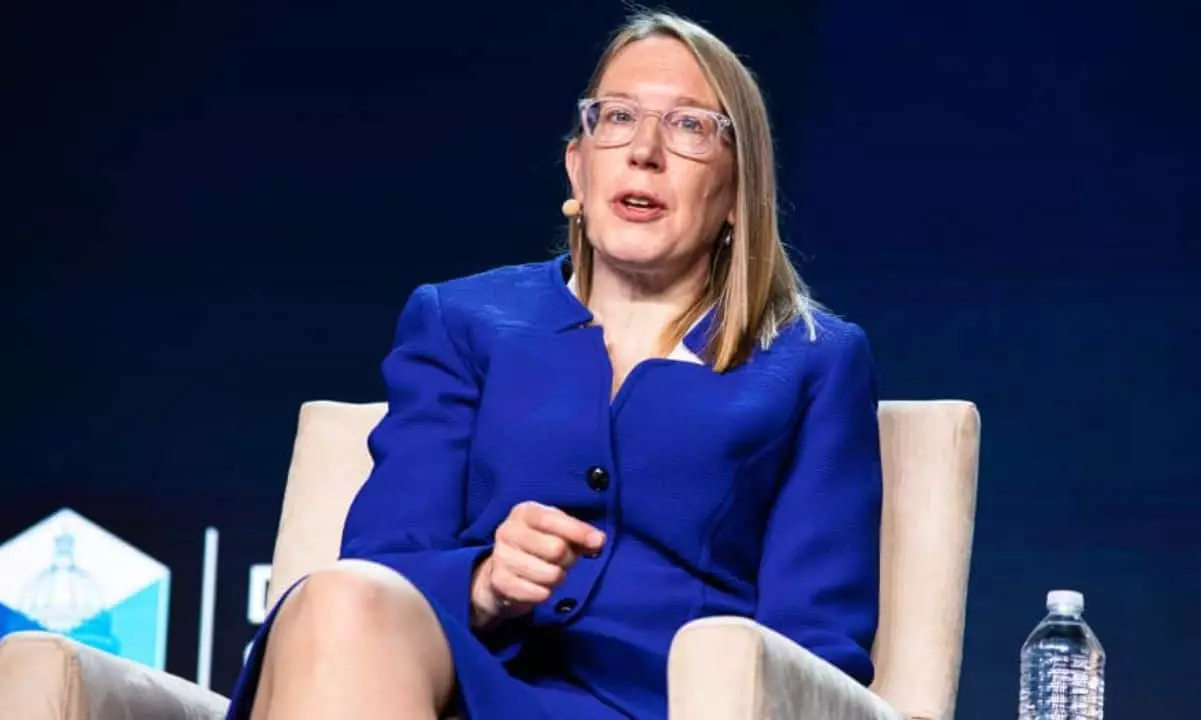In a recent appearance on Fox Business, Hester Peirce, a Commissioner at the U.S. Securities and Exchange Commission (SEC), articulated her vision for the future of cryptocurrency regulation under the impending Trump administration. Peirce identified critical issues she believes are hampering the growth of the cryptocurrency sector and presented a roadmap aimed at overcoming these obstacles. Her proposals reflect a desire for clarity and collaboration between regulatory bodies and industry stakeholders, crucial for fostering a conducive environment for crypto innovation.
One of the primary concerns raised by Peirce relates to the operational constraints imposed on cryptocurrency companies, particularly through a controversial initiative known as “Operation Chokepoint 2.0.” This term has surfaced in discussions around alleged government-driven efforts to restrict financial services for the cryptocurrency ecosystem. Peirce emphasized the necessity of dismantling these obstructions, stating unequivocally, “Step one is to stop this approach of trying to prevent crypto from getting access to the services that it needs.” This assertion highlights a fundamental struggle within the industry: the perpetual challenge of accessing traditional financial systems, which are essential for transaction facilitation and growth.
This perspective aligns with a broader criticism of governmental actions perceived as hindering innovation in the digital assets space. As cryptocurrency becomes increasingly mainstream, understanding and removing these barriers is essential for the long-term viability of the sector.
The second focal point of Peirce’s strategy is the urgent need to delineate the SEC’s regulatory scope regarding cryptocurrency. By clarifying what constitutes a security, Peirce aims to eliminate confusion surrounding which digital assets fall under the SEC’s purview. This clarification could offer much-needed guidance for startups and established firms alike.
Regulatory uncertainty has been cited as one of the largest impediments to the growth of the cryptocurrency sector. Inconsistent regulations can lead firms to hesitate before entering the market or expanding their services. Peirce’s call for an open dialogue between regulators and industry representatives is particularly noteworthy. By engaging in this collaborative discussion, the policy framework can evolve transparently, ensuring that all stakeholders can navigate the regulatory landscape with assurance.
The Implications of Operation Chokepoint 2.0
Recent developments surrounding Operation Chokepoint 2.0 have fueled further scrutiny of governmental policies towards the crypto sector. Coinbase, a leading cryptocurrency exchange, disclosed documents through a Freedom of Information Act (FOIA) request that reveal communications viewed as evidence of efforts to suppress crypto businesses. While this initiative has yet to manifest in formal bans, it does raise alarms about the increasing politicization of financial services, particularly against the backdrop of accusations that government bodies attempt to marginalize the cryptocurrency ecosystem.
U.S. Representative French Hill has announced intentions to investigate these allegations of politicized debanking. He argues that banks ought not to terminate customer accounts without significant justification, underpinning the concern that governmental overreach could deter financial institutions from engaging with crypto businesses. This dynamic not only threatens the foundation of many crypto companies but also raises ethical questions about the role of government in democratic economies.
The Global Outlook and Impact
Concerns about the ramifications of Operation Chokepoint 2.0 extend beyond the United States. Charles Hoskinson, the founder of Cardano, has stressed the global implications of regulatory overreach, perceiving it as an organized attempt to intimidate and stifle innovation in the cryptocurrency space worldwide. The geopolitical component of cryptocurrency regulation cannot be understated, as countries across the globe navigate their interactions with digital assets.
In this context, Peirce’s advocacy for a redefined regulatory approach takes on even greater significance. By proposing a framework that encourages engagement rather than restriction, the SEC might help position the U.S. as a leader in cryptocurrency innovation, rather than as an impediment to growth.
Peirce’s recommendations for a reformed regulatory landscape underscore the urgent need for clarity and collaboration in the cryptocurrency industry. Stopping the restrictive measures of initiatives like Operation Chokepoint 2.0, alongside establishing a clearer regulatory framework, represent crucial steps in fostering a healthy ecosystem where digital innovation can flourish. The dialogue surrounding cryptocurrency regulation is evolving, and with it, the opportunity for a brighter future within the sector.
















Leave a Reply